A 34-year-old patient with a complex congenital heart condition gave birth to a healthy infant at 35 weeks, after a high-risk delivery at The Mount Sinai Hospital. During the pregnancy, she was under the supervision of Ali N. Zaidi, MD, Director of Adult Congenital Heart Disease at Mount Sinai Heart, and Lauren Ferrara, MD, with the Maternal Fetal Medicine team at the Raquel and Jaime Gilinski Department of Obstetrics, Gynecology and Reproductive Science at Mount Sinai.
The patient, Alyssa Simela, was born with tricuspid atresia, a disorder in which the valve that controls blood flow from the right upper chamber of the heart to the right lower chamber does not form. She underwent several surgical procedures, including the Fontan procedure, which allows the systemic flow of venous blood directly to the lungs, without passing through a ventricle. Patients with this heart defect have only a small chance of successfully carrying a child to term and have a high risk of developing heart complications during pregnancy and delivery.
Alyssa had already defied these odds with the birth of her first child in 2019. However, after she became pregnant again in February 2022, she began to experience palpitations and shortness of breath. She had recently transitioned her care to Dr. Zaidi, a cardiologist who specializes in Adult Congenital Heart Disease (ACHD). Dr. Zaidi made changes to her medications to help control the palpitations and followed her very closely during her pregnancy.
“It is possible to be pregnant and have a successful birth after having a Fontan operation like Alyssa,” Dr. Zaidi explains. “However, it may be too risky for some women with such complex heart conditions. It is important to discuss any potential pregnancy with your adult congenital heart disease specialist."
Arrhythmias and heart failure are the most frequent cardiac complications, and miscarriages are also common in these patients. Successful pregnancies are often complicated with premature deliveries and intrauterine growth retardation. “Such patients need ongoing multidisciplinary care involving specialists from the Adult Congenital Heart Disease, Maternal Fetal Medicine, and Obstetric Anesthesia teams, which we are able to provide at Mount Sinai,” Dr. Zaidi says.
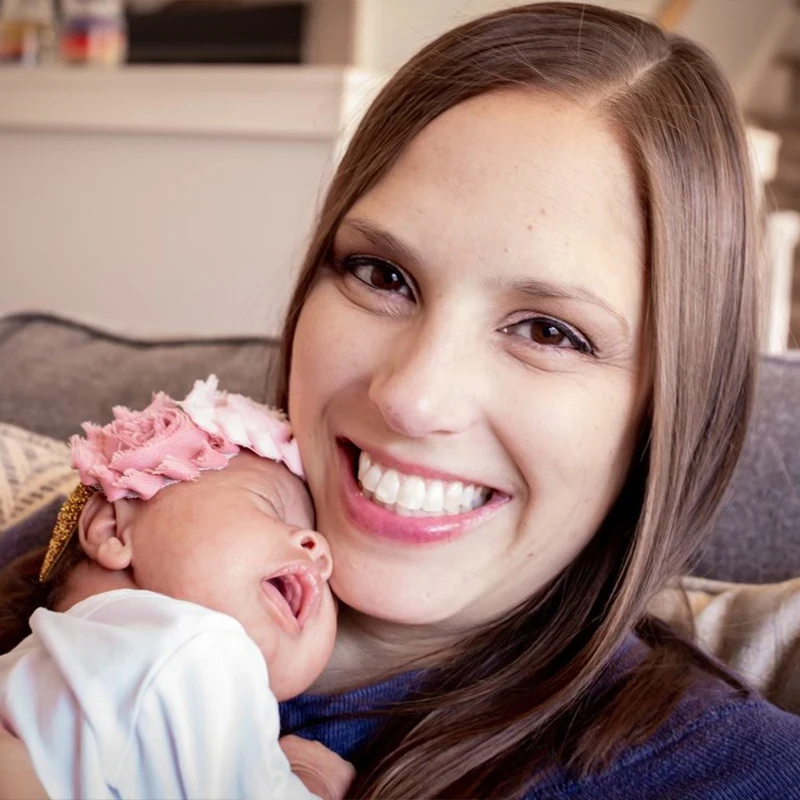
Alyssa Simela with her baby, who was born at 4 pounds, 6 ounces.
“The most incredible moment was when Dr. Franz removed the breathing tube, and Alyssa immediately asked how her heart and her baby were.”
Kali Hopkins, MD
Dr. Ferrara, Assistant Professor of Obstetrics, Gynecology and Reproductive Science, and a member of Mount Sinai's Maternal Fetal Medicine team, was responsible for Alyssa’s obstetric care. With Alyssa, Dr. Ferrara and Dr. Zaidi decided on a plan to induce in November 2022, to avoid the stress that labor would exert on her heart.
“Alyssa was more symptomatic than she had been with the first pregnancy,” Dr. Ferrara says. “This, of course, was worrisome to both myself and Dr. Zaidi, causing us to watch her more closely. Although our goal is to prolong pregnancy to as close to 39 weeks as possible for fetal well-being, the mother’s safety has to take priority.”
However, Alyssa went into voluntary labor in October, at 35 weeks. When she arrived at The Mount Sinai Hospital, she was in severe pain, but there was no time to administer an epidural. Luciana Vieira, MD, Assistant Clinical Professor of Obstetrics, Gynecology and Reproductive Science, and a member of the Maternal Fetal Medicine team, oversaw her delivery. After 45 minutes, the team delivered a baby girl weighing 4 pounds, 6 ounces. The baby was in good health, and despite her prematurity did not need admission to the Neonatal Intensive Care Unit.
“Alyssa came in to the hospital in active labor, so was having a lot of pain from contractions, but she didn't have to push for very long,” Dr. Vieira says. “However, her case became much more complicated after the delivery.”
Her placenta had not naturally separated after the delivery, and Alyssa began to hemorrhage. She was rushed into surgery to remove her placenta. Her heart condition put her in grave danger in this situation—bleeding or a fast, irregular heart rate could potentially prevent blood from getting to the pumping chamber of her heart and, therefore, to her vital organs.
Her heart had already been put under enormous strain during the birth, her heart rate was becoming dangerously slow, and her lips were turning a deep purple color, Dr. Vieira recalls. A team of specialists were brought in to stabilize her heart and blood pressure. Eric Franz, MD, Assistant Professor of Anesthesiology, Perioperative and Pain Medicine, administered the general anesthetic, with support and insights from Kali Hopkins, MD, fellow in Adult Congenital Heart Disease.
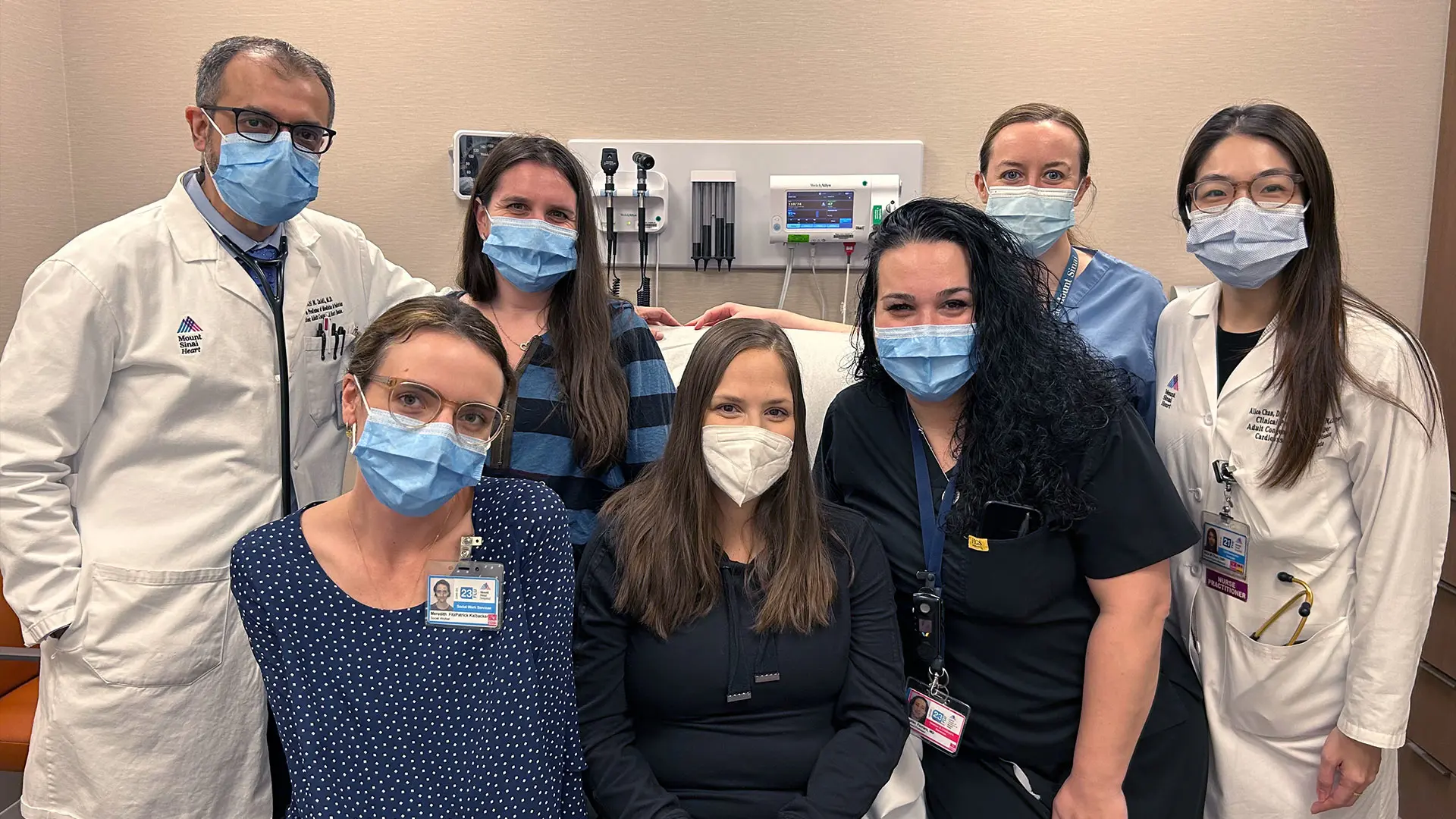
From left, Ali N. Zaidi, MD, Meredith Kalbacker, LCSW; Lindsay Nortman, RN; patient Alyssa Simela; Lauren Ferrara, MD; Kali Hopkins, MD; and Alice Chan, DNP.
“Alyssa’s blood loss and administration of anesthesia put significant strain on her heart given her underlying anatomy,” Dr. Hopkins says. “Though a tenuous situation, the Anesthesia and OB teams worked skillfully and rapidly to administer blood and strong medications to raise her blood pressure.”
Once she stabilized, Dr. Vieira and the Maternal Fetal Medicine team successfully removed the placenta. “This is the advantage of getting care at a world-class tertiary care center like Mount Sinai,” Dr. Franz says. “We are able to expeditiously bring in all the interdisciplinary expertise needed for complex cases such as Alyssa’s.”
“The most incredible moment was when Dr. Franz removed the breathing tube, and Alyssa immediately asked how her heart and her baby were,” Dr. Hopkins says.
Alyssa spent several days in the cardiac ICU before she was finally reunited with her daughter, and months later, both were doing well. She feels that the expertise of Dr. Zaidi and Dr. Hopkins and the fast response of the Mount Sinai Maternal Fetal Medicine team were crucial for this positive outcome, especially given the severity of this case.
Alyssa is back to following her pre-pregnancy care, with ongoing monitoring of her heart rhythm and function. She says growing up with her heart condition has made her very aware of her heart health. “I put my heart through the ultimate stress test with delivering my second child,” Alyssa says. “But I believe because I stayed healthy and active before and during my pregnancy that I was able to endure that. Now, postpartum, I’m getting back into my workout routine and continuing to eat a heart healthy diet.”
Dr. Zaidi credits this dedication to her being able to have children, and surviving this experience. “Alyssa is truly incredible! She has severely complex CHD, and despite multiple operations, she wants to live a full life, have a family, and enjoy taking care of her children. There is no better outcome than to see a young woman with congenital heart disease reach her goals and dreams, to see her smile when she sees her kids. This would not happen without the multidisciplinary care at Mount Sinai, but mostly because of Alyssa’s own determination, desire, and inner strength.”
Featured
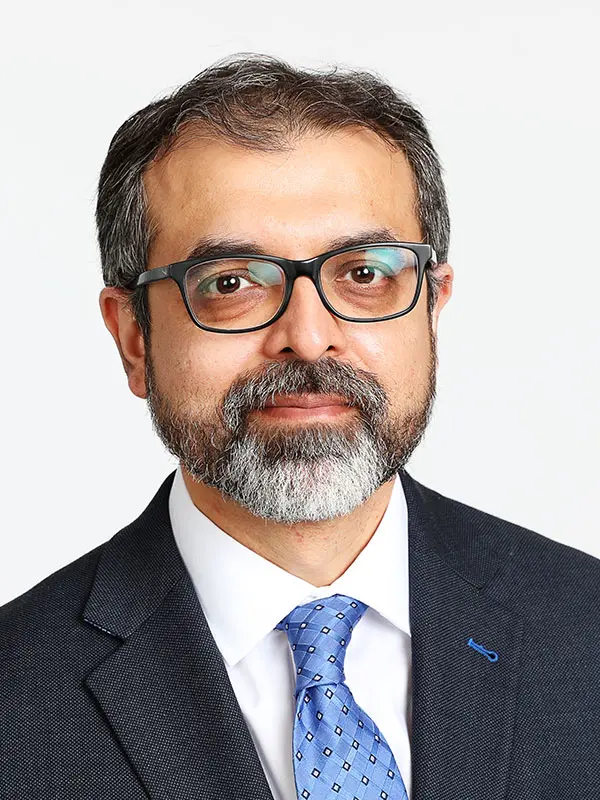
Ali N. Zaidi, MD
Director of the Adult Congenital Heart Disease Center; Associate Professor of Medicine (Cardiology), and Pediatrics
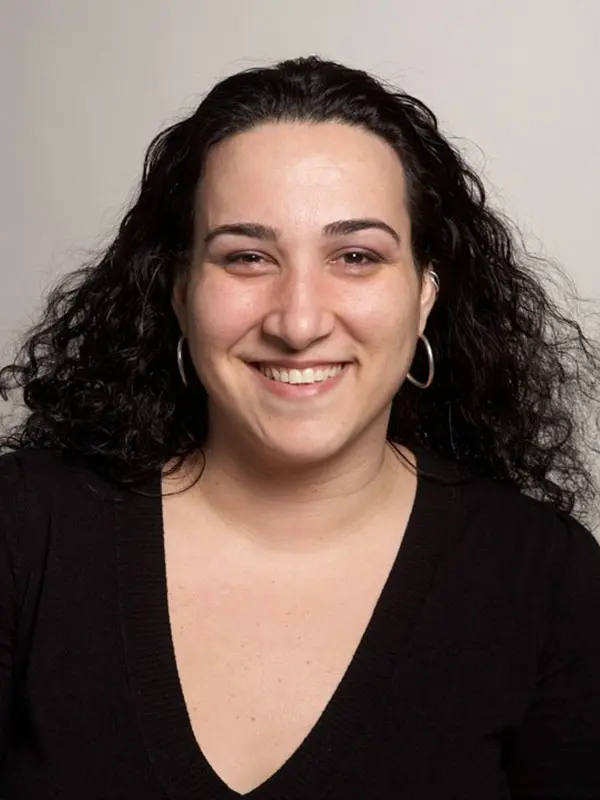
Lauren Ferrara, MD
Assistant Professor of Obstetrics, Gynecology and Reproductive Science
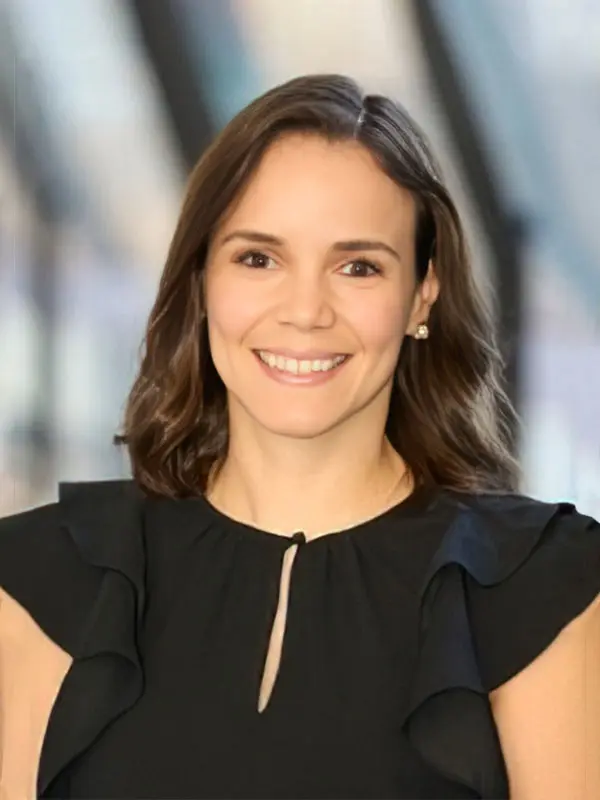
Luciana Vieira, MD
Assistant Clinical Professor of Obstetrics, Gynecology and Reproductive Science
